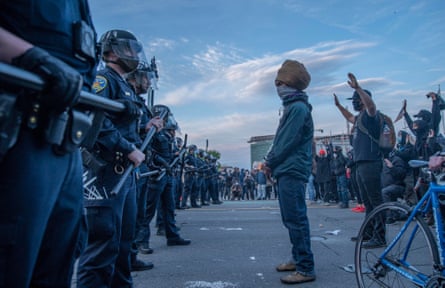Congresswoman Ilhan Omar condemned the United States’ failure to curb police violence, saying in an interview with the Guardian that brutality against Black Americans had escalated since George Floyd’s murder.
“Regardless of the heightened scrutiny and spotlight on state-sanctioned violence on to Black bodies, it still continues to happen at the same rate, if not higher,” the Democratic representative said on Tuesday. “We are not in a good place.”
Omar spoke by phone from Minnesota on Tuesday after a United Nations human rights group visited her district as part of a two-week tour of US cities focused on police killings and racism in the US criminal legal system. The UN experts heard emotional testimony in Minneapolis from families of people killed by police and formerly incarcerated people who were subject to solitary confinement as youth and continue to suffer from the trauma.
On Wednesday, Omar is also proposing a House resolution condemning police brutality worldwide, calling for reallocating funding in the US toward mental health programs, counseling and violence prevention; ending the use of militarized equipment and police tactics in the US and abroad; and prohibiting the sales of arms, ammunition and “less-lethal” equipment to countries with documented human rights violations.
“The United States has always professed these values of human rights and rarely subjects itself in the scrutiny of these systems that we support internationally,” said Omar, the deputy chair of the congressional progressive caucus, who has championed criminal justice reforms. The representative, a frequent target of Republicans and rightwing media, has previously introduced legislation to criminalize violence against protesters, investigate police misuse of force and to restrict the use of no-knock warrants.
Floyd’s murder and the 2021 police killing of Daunte Wright, the 20-year-old who was pulled over for having an expired tag and hanging air freshener, both occurred in Omar’s district. At the State of the Union address this year, the congresswoman brought as her guest the father of Amir Locke, a 22-year-old who was asleep on a couch when Minneapolis police barged into the apartment in a pre-dawn raid and killed him within seconds.
As Minneapolis braces for the third anniversary of Floyd’s murder this month, advocates’ data analysis has shown that police in the US continue to kill more than three people a day, and that 2022 was the deadliest year on record since experts first started doing nationwide tracking in 2013.
“It’s dangerous to continue to make the same mistakes and invest in systems that are not only broken, but do not serve the needs of the community,” said Omar, criticizing the “tough on crime” rhetoric that has increased in recent years as lawmakers roll back reforms and seek to expand police powers. “We know what will work and what is needed. Research and data points to all these other interventions being much more meaningful in reducing crime than what we see when we continue to invest just in policing.”

A protest in the wake of George Floyd’s murder. Critics say little has changed in the three years since, with police killings still frequent in the US. Photograph: China News Service/Getty Images
She said non-policing efforts can be more effective, pointing toward a $500,000 US justice department grant for a Minnesota gun violence prevention program that provides trauma recovery services to victims through hospitals, in an effort to break cycles of shootings. “We’ve seen the drastic changes that are experienced by the few people served by the gun violence prevention programs that are funded.”
Mothers whose sons were killed by police in Minnesota testified on Tuesday about the horrors of law enforcement instantly using deadly force on their loved ones in crisis, then aggressively defending the killings.
The formerly incarcerated witnesses talked to the UN about being locked alone in small cells for hours or days on end, their cries for help ignored. A recent new investigation found that solitary confinement of children continued to be a widespread practice in Minnesota.
“The inhumanity of the human rights violations … is baffling,” Omar said. “We have staggering numbers of people who are dying in our prisons and who are living in the most inhumane conditions. We have staggering levels of people struggling with mental health who are being denied access to healthcare that they deserve. We’re seeing people who are being driven to insanity because we seem to lack the compassion of understanding that human beings need interaction.”
She noted that some in solitary are deprived of all human contact, blankets and a proper place to sleep, amounting to “torture”. In recent weeks, there have been reports of deaths in US jails, including a man in Indiana with schizophrenia who was left naked in solitary for weeks, and a man with mental illness who was found covered in bedbugs.
“The fact we’re allowing young, developing brains with so much potential … to be confined in solitary is just horrendous,” Omar said, adding that the US prison system remained focused on punishment and not on preparing people to return home: “These are things that shouldn’t be happening anywhere in the world, and certainly shouldn’t be happening in the United States.”
The UN experts, part of a human rights panel formed after Floyd’s murder, are also visiting Washington DC, Atlanta, Los Angeles, Chicago and New York. In LA, the group toured the county jail system, which has been condemned for its squalid and “barbaric” conditions. The panel will present a report on its findings to the UN later this year.
Sam Levin is a correspondent for Guardian US, based in Los Angeles. Click here for Sam's public key. Twitter @SamTLevin


Spread the word